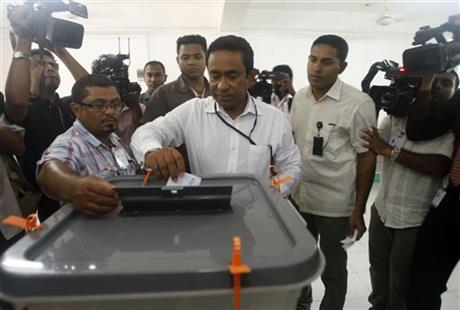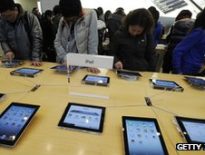MALE, Maldives (AP) — Voters in the Maldives went to the polls Saturday in the hope that questions about the legitimacy of their government will finally be answered 19 months after the ouster of the first democratically elected president in the country known for its luxury island resorts.

About 240,000 people were eligible to vote in the election to pick a leader from among four candidates, including the Indian Ocean archipelago’s first democratically elected president — who says he was ousted in a coup d’etat.
Mohamed Nasheed, who won the country’s first multiparty election in 2008, ending a 30-year autocracy, resigned last year after weeks of public protests and slipping support from the military and police. He later said he was forced to resign at gunpoint by mutinying security forces and politicians backed by the country’s former autocrat.
Though a domestic commission of inquiry has dismissed Nasheed’s claim, the country has been in political turmoil ever since. Nasheed has repeatedly dismissed as illegal the government of his former vice president — current President Mohamed Waheed Hassan, who is also an election candidate.
They are competing against Yaamin Abdul Qayyoom, a brother of Maldives’ former autocrat Maumoon Abdul Gayoom, and businessman Qasim Ibrahim.
“The ruling government came (to power) not in a very good manner,” Ahmed Ilyas, a 37-year-old port employee, said after voting. “Hopefully after the election the international community and the locals will fully cooperate with the government.”
But Ilyas does not expect any of the candidates to win an outright 51 percent of the vote in the first round, which would mean the top two vote getters would have to face off in a second round of voting on Sept. 28.
Qayyoom and Nasheed are considered leading candidates, with both hoping to secure a first-round win.
About 240,000 of the 350,000 citizens of the Maldives are eligible to vote. All of them are Muslims.
“We are hoping it (the government) will be stable instead of an interim one in which we don’t know which way we are going,” said Jameel, a young voter who would give only his first name.
The next president must form a credible government, build up public confidence in government institutions that are accused of political bias, such as the courts, police and military, and deal with pressing issues, including high unemployment, increasing drug addiction among young people and improving transportation among the nation’s far-off islands in the Indian Ocean.
Nasheed’s fall from power last year came after he ordered the military to arrest a senior judge whom he accused of bias.
“This is absolutely crucial,” Qayyoom said of the election after voting at a school in the capital, Male. “Things have gone so wrong in the past five years, it’s absolutely imperative that we change for the better this time.”





